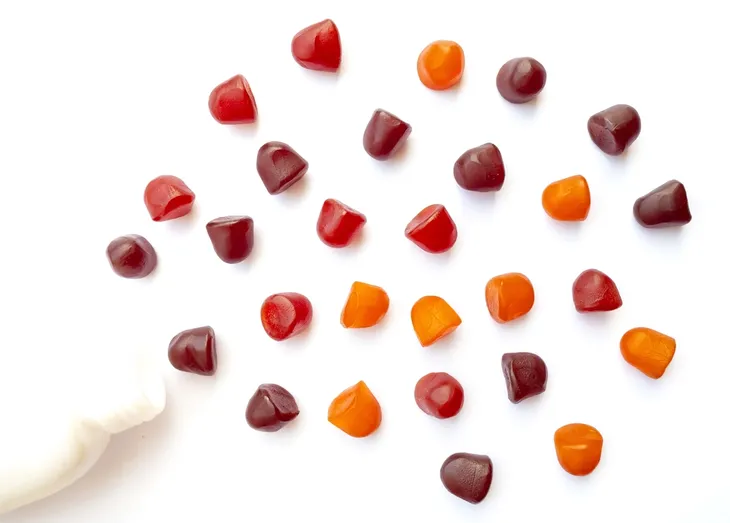- Many people rely on caffeine to give them an energy boost in the morning and afternoon.
- While coffee is usually the drink of choice, caffeine gummies are a new convenient way to boost your energy.
- While caffeine gummies can provide a convenient and quick energy boost, it’s always important to consult your doctor before taking a new supplement. And never give caffeine gummies to children.
Many people turn to caffeine when they’re feeling tired in the morning or suffering from an afternoon slump. Lucky for us, caffeine is widely available in many forms from a warm cup of coffee or green tea to energy drinks. But one product is making a big impact on the caffeine market and may change the way we consume caffeine entirely. These are known as caffeine gummies.
While chewing on caffeinated gummies sounds convenient and possibly delicious, you might wonder if they actually work. Can they really provide the same energizing jolt as a cup of coffee? We’ll answer that and more in this article!
What Are Caffeine Gummies?
Caffeine gummies are exactly what they sound like: gummy supplements that are infused with caffeine. Depending on the company, the gummies may also be infused with additional flavors, such as chocolate, salted caramel, or fruit.
According to Sleepopolis, caffeine gummies are also sometimes infused with other nootropics to enhance mental function. It’s also worth noting, caffeine is also considered a nootropic. Other foods and supplements that are considered nootropic foods include fish oil, plant ginkgo Biloba, tea, and chocolate.
How Much Caffeine Is in a Caffeine Gummy?
The amount of caffeine in caffeine gummies will vary from brand to brand so it is important to read the nutritional label. That said, Sleepopolis said the gummies generally have between 40- to 200-milligrams (mg) of caffeine per gummy.
To compare, the U.S. Food and Drug Administration (FDA) states that an 8-ounce cup of black green tea contains 30- to 50-mg whereas an 8-ounce cup of coffee contains about 80- to 100-mg. Energy drinks, on the other hand, can contain up to 250-mg per 8-ounce serving.
Do Caffeine Gummies Work?
The short answer is yes, caffeine gummies can give you an energetic boost. But the way they work is slightly different than drinking a cup of coffee.
Sleepopolis explains that when you drink a cup of coffee, the caffeine is absorbed into your digestive system, and then it’s dissolved into your fat molecules and is able to cross into the brain. Caffeine is typically absorbed into the body within 45-minutes but can “peak in the bloodstream as quickly as 15 minutes — or as late as 2 hours,” notes the source.
So what’s the difference with caffeine gummies? The source says the major difference is caffeine chews are one of the fastest methods of absorption, which we’ll explain in more detail later.
Are Caffeine Gummies Safe?
Consuming too much caffeine can have adverse effects, so it’s important to know the limit. The FDA states that toxic effects, such as seizures, may occur if you rapidly consume 1,200-mg of caffeine.
Sleepopolis says that caffeine gummies from reputable manufacturers should be safe to consume as long as you follow the directions. And while caffeine is safe for most people, it’s always a good idea to check in with your doctor before taking a new supplement.
Caffeine Gummies Are Not Safe for Children
It should come as no surprise that caffeine gummies are not safe for children. You wouldn’t give your young child a cup of coffee, right? So they should not be eating caffeine gummies.
The American Academy of Child and Adolescents Psychiatry (AACAP) says currently pediatrics advise against caffeine for children under 12-years old. They also advise against any use of energy drinks for all children and teens and suggest limiting caffeine to 100-mg per day for those 12- to 18-years old.
With this in mind, if you choose to try caffeine gummies and have young children in your home, it’s incredibly important to store them out of reach and sight. They typically look like candy so they can be tempting for a child.
The Benefits of Caffeine Gummies
The biggest benefit of caffeine gummies is convenience. You don’t need to wait for your coffee to brew at home or wait in a long drive-thru line to get a cup of coffee.
Better yet, many brands have online shops where you can get the caffeine gummies delivered to your front door. Some even offer subscription services if you don’t want to run out. Let’s take a look at a few other added benefits next!
Benefit: A Quick Boost
Another major benefit of caffeine gummies is their fast absorption. When you drink coffee, you have to take the time to make (or order!) and drink the beverage and then wait for its effects to kick in. So, Sleepopolis says the major difference between coffee and caffeine chews is that the chews are one of the fastest methods of absorption plus they only take seconds to chew.
The source references a study that examined caffeinated chewing gum and found when chewing a caffeine product, your body can absorb the caffeine within 10-minutes. More impressive, nearly 100-percent is absorbed within 40-minutes.
Benefit: Workout Boost
Another benefit of caffeine gummies is they can provide an energy boost for your workout! Whether you work out early in the morning or after a long day at work, gummies are a quick and convenient way to boost your energy. Plus, working out with coffee sloshing around in your stomach doesn’t sound all that great.
If you don’t feel like you need a caffeine boost before your workout, the Seattle Gummy Company also notes they’re a convenient option if you need an extra push in the middle of a workout. Simply chew on a few gummies during a water break and you’ll be ready to jump back into your workout in no time.
Caffeine Gummies vs. Coffee: Which Is Better?
So, is it really worth giving up your morning cup of coffee for gummies? That’s a personal choice only you can answer. Sometimes, a cup of coffee is all about the ritual and less about its energizing effects but if you only like coffee or caffeinated beverages because of the end result, then gummies may be the better option for you.
Additionally, Sleepopolis also points out that it’s hard to know exactly how much caffeine you’re consuming in a cup of coffee but with gummies, you know the precise dose. And sometimes, it simply comes down to convenience.
If you’re thinking about trying caffeinated gummies, don’t forget to check in with your doctor. If they give you the all-clear only buy from reputable brands and always read the label and follow the instructions.
The Benefits of Caffeine
In case you need another reason to enjoy your morning cup of coffee or caffeine chews, it turns out caffeine has a few notable health benefits in addition to its energizing effects. Healthline says there is some evidence that claims caffeine may help the following:
- Support brain health
- Support heart health
- Lower risk of type 2 diabetes
- Promote weight management
- Lower risk of depression
- Lower risk of liver conditions
- Enhance athletic performance
How Much Caffeine Is Too Much?
While caffeine can be a great energy booster, too much can wreak havoc on your health. So how much caffeine is too much? The FDA says most healthy adults can consume up to 400-mg per day. This is equal to about 4- to 5–cups of brewed coffee. However, keep in mind, the caffeine content can vary widely.
Caffeine can also affect people differently so it’s essential to know your limits. Be on the lookout for signs that you’ve consumed too much caffeine. According to Healthline, the following are some of the possible side effects to watch for:
- Anxiety and nervousness
- Insomnia
- Digestive problems
- High Blood Pressure
- Rapid heart rate
- Fatigue
- Frequent urination and urgency
As mentioned earlier, the FDA notes that toxic effects, such as seizures, can occur if you rapidly consume about 1,200-mg of caffeine. Beware of pure and highly concentrated caffeine products and always read the labels.
Other Healthy Ways to Improve Your Energy
Many people rely on caffeinated products to boost their energy throughout the day but there are many other natural and healthy ways you can improve your energy. One of the most important tips is to improve your sleep. Getting good quality sleep every night is detrimental to your health and energy levels. Try to stick to a regular sleep schedule (even on weekends), and you may need to improve your sleeping environment, such as investing in a new mattress, lowering your room temperature, dimming the lights, and avoiding screens before bed.
What you do throughout the day can impact your energy levels too. Harvard Health says the following are other healthy ways you can improve your energy:
- Manage stress
- Lighten your workload
- Quit smoking
- Eating foods with a low glycemic index
- Avoiding caffeine in the afternoon
- Staying hydrated















